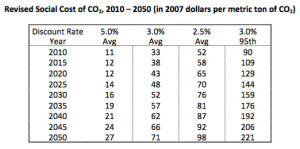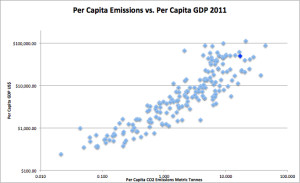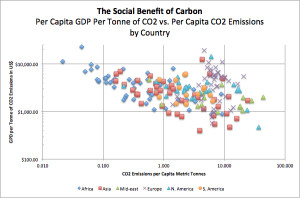By Ed Caryl
We see many articles and posts about the Social Cost of Carbon (SCC) as an excuse for carbon taxes, but nothing about the Social Benefits of Carbon (SBC). The very reason civilization is consuming fossil fuels and producing carbon dioxide is ignored. Carbon-based fuels drive civilization and have done so since man’s taming of fire. They heat and light our homes and places of business, transport us and our goods, and fuel industry. All that energy production has value. Ignoring this value is as insane as if you only entered checks in your checkbook and ignored deposits.
There is great argument about the value of the SCC. The amounts are estimates based on the costs of production and future pollution and impacts primarily, and range from a few dollars per ton of CO2 to a few hundred dollars, depending on the computation method. Here are the U. S. government’s most recent figures:
Table 1 from whitehouse.gov here.
But all these computations ignore the benefits attached to consuming carbon fuels. At first glance, it may seem difficult to put a value on benefits due to all the myriad ways that fossil fuels are used. Producing electricity is one use, and this was addressed in Boosting Per Capita Prosperity And Energy Consumption Is The Only Way To Care For Our Planet posted here in June 2013. But a more fundamental way to measure the prosperity that fossil fuels provide is to simply compare the per capita Gross Domestic Product (GDP) to the per capita CO2 emissions. The plot below uses data from the World Bank found here and here. The data from 2011 was used because that year had the most complete data.
Figure 1 is a plot of emissions versus GDP for 189 countries for which the World Bank has data for 2011. Both axis are logarithmic scales. For a version of this graph with country labels and population, go to this link at GapMinder.
The outliers in Figure 1 are small countries with unusual circumstances, such as Luxembourg and Qatar (upper right). The United States is the dark blue dot at the upper right. The European countries are clustered to the left of the US. It is clear that a high GDP requires high emissions but it doesn’t answer the question as to the value of a tonne of CO2. The next plot answers that question by dividing the per capita GDP by the emissions per capita for each country and plotting that against per capita emissions.
Figure 2. The vertical scale is the per capita GDP per metric tonne of CO2 emitted, this is the Social Benefit of Carbon in each country. The horizontal scale is the CO2 emissions per capita. The large blue triangle on the right is the U. S. Both vertical and horizontal scales are logarithmic.
In figure 2, the first 19 countries on the left are in Africa, with very small emissions per capita but high GDP relative to those emissions. The European countries on the right have high emissions but most also have high GDP relative to those emissions. The three lowest GDP dots with high emissions are “‘stan” countries in central Asia. The social benefit of carbon for the 19 African countries is quite high because they use very little carbon now and would benefit greatly from using more. The U. S. SBC is $2,924.84. The country-average SBC of all the points in figure 2 is $3,774.75. The Social Benefit of Carbon is ten to a hundred times the estimated Social Cost of Carbon in Table 1.
The Excel spreadsheet that generated the above graphics is available here.








If we look at new data and at data time lines, it will become obvious that CO2 output and indexes of prosperity (like GDP) are decoupling and that the process is getting faster.
This is easy to spot in Sweden:
http://blogs.worldbank.org/climatechange/sweden-decoupling-gdp-growth-co2-emissions-possible
But it is also happening on a global level:
http://blogs.worldbank.org/climatechange/sweden-decoupling-gdp-growth-co2-emissions-possible
If we go back in time enough (stoneage?) we can easily show, that an open fireplace in your cave is a sign of prosperity, and so we should not give up on open fire and living in caves…
“If we go back in time enough (stoneage?) we can easily show, that an open fireplace in your cave is a sign of prosperity, and so we should not give up on open fire and living in caves…”
Having a stack of firewood in ones garden means more prosperity than relying on a wind turbine driven electric heater. It means less freezing during blocking highs in Winter.
And another interesting aspect: Using less fossil fuels is SAVING money.
Energy efficency is helping a lot:
http://www.businessgreen.com/bg/news/2429696/ten-billion-tonnes-co2-emissions-saved-thanks-to-energy-efficiency-over-past-25-years-says-iea
And many countries do not have their own fossil fuels, so we are supporting other countries, in which the easy availability of fossil fuels is a big problem (getting rich with little work is a ultimate source of corruption and antidemocratic developments).
But it seems your claims of possible decouplings, and savings, both depend on assumptions about the relative social and economic costs of CO2.
If as the article suggests these assumptions are false your arguments fall right along with them.
“But it seems your claims of possible decouplings, and savings, both depend on assumptions about the relative social and economic costs of CO2.”
I do not think so. Ed is claiming a statistical connection: More CO2 means more prosperity/GDP.
It is obvious, that this is no longer true, as GDP keeps growing in many countries while CO2 output is going down.
There was a CO2 to GDP connection in the past, but it does no longer exist in developt nations and it is unclear if the connection will remain strong in countries catching up.
“I do not think so. Ed is claiming a statistical connection: More CO2 means more prosperity/GDP.”
Only up to a certain point. In the Western World, the U. S. and the European Union, CO2 emissions have stabilized or are falling. But this is due mostly to the switch to natural gas instead of coal, and only slightly due to renewables. The increasing GDP is due to increased efficiency and the production of higher value products. An example is the increase in automobile fuel mileage.
In the rest of the world, more prosperity/GDP requires more emissions, especially in poor countries like China and India.
“(getting rich with little work is a ultimate source of corruption and antidemocratic developments).”
sod, that sounds like a description of a wind turbine owner.
Thanks for this post. It’s intuitively obvious that the social benefits of CO2 emission are greater than the social costs.
Glad to see that someone has quantified the benefits. Most benefit-cost studies / cost-benefit analyses (CBA) simply ignore the benefits.
A New Zealand study ignored the global benefits but claimed that New Zealand would benefit as global warming drives up the price of agricultural products that NZ exports.
The only CBA I have seen that fairly estimated social benefits was done for Quebec in which warmer summers and longer growing seasons were claimed as benefits.
“warmer summers and longer growing seasons were claimed as benefits.” But keeping warm in winter and airline trips to Aruba were not! How do people miss the obvious?
” It’s intuitively obvious that the social benefits of CO2 emission are greater than the social costs.”
I am curious: How much did those oil countries and the latest wars (Syria, Iraq) factor into your analysis of social costs of CO2?
Are you for real??
While the wind turbinists bemoan the evils of modern mechanized warfare, they could learn a bit by looking into the way wars were fought before that time.
https://en.wikipedia.org/wiki/Genghis_Khan
Sod, why would would they?
“Sod, why would would they?”
Because obviously their is war over oil sources happening right now in Syria and iraq.
And war is not a social benefit.
Iraqi production is less than 4% of the global production and Syria is less than 0.04%. And the fact that there is a war going on in the region does not affect the value of the resources that come from there. The war is not over the resources. It is largely a sectarian war driven by ideology. Russia has recently turned it into a regional power issue. But Russia is not interested in the oil. They amount in Syria is a tiny fraction of what Russia produces.
https://en.wikipedia.org/wiki/List_of_countries_by_oil_production
” And the fact that there is a war going on in the region does not affect the value of the resources that come from there.”
Your causal chain is the wrong way round. The fact, that the resource from that region (oil) still has so much value, is fueling those wars.
The oil, like in many of those new wars, is a reason to fight over in Iraq and Syria. It is giving money to the groups running those wars and so keeps the war going.
But different groups in those places also receive money from other oil states (if we want, we could even add Russia and its gas in).
In general, oil (and to a lesser extend coal) are not good for most countries. Those that do not have it, have to import it, often at huge costs. By buying it, they give money to countries with often dubious plans.
But even the countries that have oil, are in difficulties. The very nature of the stuff (easy to get out, needing very little work) leads to unfair distribution of money, causing undemocratic structures and social strive.
The scientific context that you want to google is “rentier state”.
Start reading here, for example:
https://en.wikipedia.org/wiki/Rentier_state
What you are saying is true, but irrelevant to the article. Some of these rentier states have taken advantage of the income, like Qatar and Abu Dhabi, to raise the standard of living. Others, like Libya and Iraq, have not. The point of the article is that fossil carbon, used wisely, increases production and net worth. It has a very positive value.
Imagine if it were instantly taken away. The world would instantly return to the early iron age, then to the stone age, as iron tools wore out. That would truly be the Malthusian collapse.
” Some of these rentier states have taken advantage of the income, like Qatar and Abu Dhabi, to raise the standard of living. ”
Abu Dhabi is using slaves to build stuff. From a social perspective i would call that a negative effect, definitely not a benefit of fossil fuels and CO2 output.
They also finance all sort of crimes and wars and an extreme amount of what they “produce” is a total waste, only benefitting very few people.
“The point of the article is that fossil carbon, used wisely, increases production and net worth.”
You have to evaluate the effect of the real use, not an effect if it was used wisely, because rather often it is not.
We could have invested in technology that saves energy, instead of wasting it. We could be using smaller cars instead of bigger ones.
“Imagine if it were instantly taken away.”
That is a false dichotomy. Coal obviously had its use, in the 19th century. But we could have started an exit from coal much faster and the world could have been were Germany is now at least 10 years ago.
Germany has not reduced its reliance on coal.
https://en.wikipedia.org/wiki/Energy_in_Germany
“Germany has not reduced its reliance on coal.”
Germany has closed multiple nuclear power plants. And Germany is exporting a lot of power.
Coal is a problem, because the EU is not doing anything against the price fall of CO2 certificates.
As the percentage of renewables increases, coal will shrink.
Another issue that Ed doesn’t take into account is that increased GDP has not been correlated with increases in the standard of living for most people in developed countries since the early 1980s. GDP is generally accepted to not be a good indicator of quality of life, and it was never actually intended to be used that way, and yet here we are decades later and it is habitually used as such by neoliberal politicians and governments and neo-classical economists.
This can be argued in different ways. How many poor people had a mobile phone/camera, computer and walking around with tons of data on a stick 30 years ago?
“How many poor people had a mobile phone”
In China, i saw very poor people (transporting dirty clothing down a mountain as a bundle on a traditional walking stick) using their mobiles.
The smartphone has become the most important tool of most people and it can be easily loaded using solar power.
That is an example of the value of a carbon-based economy. That level of technology is driven by the availability of energy to produce the components that produce the phone. That level of technology is driven by the energy available to the scientists and engineers that developed that technology. That level of technology depends on the energy to build the infrastructure that supports it. Over time, the use of energy builds the value, increasing “quality of life” but also the available possibilities. Twenty years ago we could not have had this conversation.
“That level of technology is driven by the availability of energy to produce the components that produce the phone”
The level of energy needed to produce a smartphone is tiny.
Production causes about as much CO2 as a kilogram of beef.
http://www.theguardian.com/environment/green-living-blog/2010/jun/09/carbon-footprint-mobile-phone
(just use the CO2 numbers as an indicator of energy used).
the amount of energy needed to use it is basically irrelevant. (40ct of electricity a year)
http://lifehacker.com/5948075/how-much-energy-a-smartphone-uses-in-a-year-and-what-it-means-for-your-budget
” That level of technology is driven by the energy available to the scientists and engineers that developed that technology.”
science does not use a lot of power. why would it?
” Twenty years ago we could not have had this conversation.”
But not because of a lack of energy.
How about 5.6 Billion cell phones?
http://www.howmanyarethere.us/how-many-mobile-phone-users-in-the-world/
“How about 5.6 Billion cell phones?”
Or 5.6 Billion beef steaks?
Again, those smart phones are not a big factor of energy demand (the grid supporting them is a big factor though).
If you use GDP as an indicator, you also “reward” throwing away your smart phone every year as a sign of prosperity. In the real world, the replacement by new phones with barely any difference is just a waste of resources.
Sod, those used phones go into the secondary market. They are not “wasted”. That phone your Chinese was carrying down the mountain was most likely a “used” phone. As long as they still work, they get resold. When they can no longer be repaired, they are mostly recycled.
sod 19. October 2015 at 9:32 PM | Permalink
“The level of energy needed to produce a smartphone is tiny.
Production causes about as much CO2 as a kilogram of beef.”
Ahahahaha. AHAHAHAHAAHAAAHAAHAAAHAA.
The same Guardian idiots who constantly bemoan the horrors of mining, heavy industry, and the terrible consequences of 150 rounds of etching in the chip fabs have now convinced themselves that the real apocalypse emanates from peaceful grass-eating animals.
They still manage to surprise me with their idiocy after all these years.
“GDP is generally accepted to not be a good indicator of quality of life”
Generally accepted by leftist journalists and wikipedia editors, you mean. Definitely not accepted by me. Don’t confuse mass propagation of a falsity to be acceptance by thinking people.
Look for instance into The Skeptical Environmentalist by Bjorn Lomborg who shows that starting at a certain level of GDP/capita, countries become rich enough to clean up their environment.
The USSR for instance never gave a crap for the environment – they were simply below this level.
“Generally accepted by leftist journalists and wikipedia editors, you mean.”
GDP is problematic. If a year has more cars being crashed and replaced, we will see a rise of GDP while prosperity is actually falling.
If i waste an extra 1000$ (and growing) on oil to heat my badly insulated house each year, it gives an increase to GDP. If i use cheap insulation material to make me use less oil, i decrease the GDP while i actually increase my prosperity.
GDP is an extremely bad indicator in the power sector, with so many externalities.
That is why the calculation of the Social Benefit of Carbon uses GDP/emissions. As you insulate your house, your emissions go down, and the SBC goes up. GDP is not measured by how much money you waste, it is a measure of how much you produce.
[…] From NoTricksZone, by Ed Caryl, Oct 2015 […]
[…] https://notrickszone.com/2015/10/15/social-benefit-of-carbon-is-ten-to-a-hundred-times-the-estimated-… […]